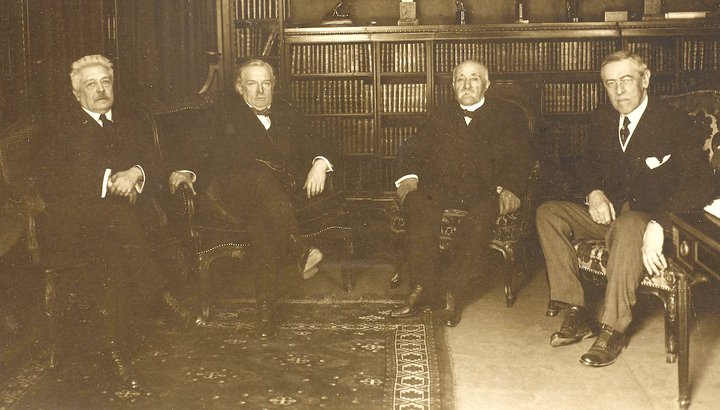Much like Trump, [Wilson] did not tolerate criticism from friend or foe…this makes Wilson’s complete silence on the pandemic understandable in only one context: he would do nothing to distract him or the nation from the war effort.
— John Barry, author of The Great Influenza
###
Future historians are bound to take notice of the irony that, almost exactly 100 years apart, this nation suffered medical crises for which the president at the time was ineptly ill-prepared. Back then, President Woodrow Wilson, faced with some 675,000 US deaths from the “Spanish” flu (which probably originated in Kansas), did and said…nothing. Even though that’s nearly six times the number of American servicemen who died fighting in World War One.
According to historian John Barry (The Great Influenza), throughout the twelve months when the Spanish flu raged through the US starting in March 1918, Wilson never spoke publicly about it. In our own time, the POTUS speaks only too publicly and too often about COVID-19, referring to it as a hoax, “not as bad” as seasonal flu (it’s ten times as lethal, according to Anthony Fauci), and now encouraging anti-social distancing rallies. Oh, and withholding funds from the one international body, the World Health Organization, with the means and experience to tackle COVID-19 on the basis of international cooperation rather than selfish (and unworkable) parochial concerns. The pan in pandemic, is Greek for “all,” Mr. President.
Despite close contact with a Brazilian official known to be infected (press secretary Fabio Wajngarten), Trump hasn’t, as far as we know, contracted the disease. Let’s hope for all our sakes he fares better than Woodrow Wilson, whose brush with the Spanish flu in Paris in April, 1919, during the negotiations that followed the end of WW1, probably changed history. Wilson’s flu was almost certainly a catalyst in the resurgence of German nationalism, the rise of Hitler and, ultimately, WW2. Prior to being stricken, Wilson had been forcefully advocating his “Fourteen Points” as the road to global peace and prosperity. In particular, he argued that the victors of “The Great War” should go easy on Germany, while “Le Tigre,” (the tiger), 77-year-old French Prime Minister Georges Clemenceau, insisted that Germany accept full responsibility for the war, pay utterly unrealistic reparations, and cede the Rhineland to 15 years of French occupation.

The Big Four at the 1919 Paris Peace Conference on June 28, the day the Treaty of Versailles was signed. Left to right: Italian Prime Minister Vittorio Orlando, British Prime Minister David Lloyd George, French Prime Minister Georges Clemenceau, and United States President Woodrow Wilson. (Wikimedia/public domain)
On the evening of April 3, at a decisive juncture in the negotiations, Wilson suddenly came down with a coughing spell so severe that he had difficulty breathing — his physician at first thought he’d been poisoned until, noting the president’s 103+ degree fever, realized it was Spanish flu. The bout changed Wilson. Whereas before he had been decisive and firm in his opposition to Clemenceau’s harsh approach to Germany, he returned to the negotiating table…and caved. According to historian Margaret MacMillan, he gave Clemenceau “the best possible deal for France.” Those closest to Wilson knew something was amiss; the president became obsessed with French spies, who was using official vehicles, and the placement of the furniture. “I never knew the president to be in as difficult a frame of mind,” wrote Wilson’s secretary, Gilbert Close, about that critical time for the future of the world.
“Our” flu, COVID-19, and the Spanish flu of 100 years ago appear to have this in common: while both viruses mainly cause upper respiratory tract and lung damage, they can, in severe cases, enter the brain via the olfactory nerve and cause neurological impairment. (Or maybe it’s not the virus itself, but inflammatory cytokines, created by the body’s own immune system as it tries to fight the virus.) In any case, according to a recent story in Wired, “…stories of other, stranger symptoms — headaches, confusion, seizures, tingling and numbness, the loss of smell or taste — have been bubbling up from the frontlines for weeks.” Which echoes what was written a century ago about many victims of the Spanish flu.
It’ll take years for this all to shake out — the heroes and the villains, the prescient and the cavalier, the good guys and the bad. Just be thankful the present POTUS isn’t called upon to make world-changing decisions comparable to those faced by mentally-impaired Woodrow Wilson. We hope.
CLICK TO MANAGE